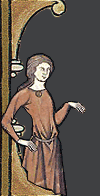
|
Period Dance
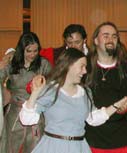 Dances are documented activities that were important during many
eras that the SCA re-enacts, including several where it was expected
that noble ladies and gentlemen knew how to dance. Much of a peoples
history and culture can be discovered through the study of their
dance (just look at Italy and England in the later middle ages).
Dances are documented activities that were important during many
eras that the SCA re-enacts, including several where it was expected
that noble ladies and gentlemen knew how to dance. Much of a peoples
history and culture can be discovered through the study of their
dance (just look at Italy and England in the later middle ages).
Within the SCA there are those who dance for the social joys that
come from dancing. Costume balls are held, period instruments are
used and, for a while, we enjoy this aspect of the past. But society
was different then. Dance was not always a social activity for large
groups of people. Those who are drawn to historical accuracy know
that dance was partly a social contest. Today we show stature by
how large and fancy our house or car or cottage is - but in some
eras it was all about dance.
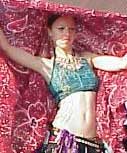 For the artist within the SCA - dance is a form of expression to
be explored. At times we have contests to see what can be done with
a dance. John Playford (an English Dancing Master from 1651) may
have documented in his book the movements of people required to
perform a certain dance but there was so much more he didn't document:
Which instruments were used? Should the music be light, sombre or
something in between? Should a couple dance exactly together - or
perhaps just keep missing each other? By playing with the form of
the dance it can become a vivid expression of happiness or sorrow
in that the partners just never wind up together or something else
again.
For the artist within the SCA - dance is a form of expression to
be explored. At times we have contests to see what can be done with
a dance. John Playford (an English Dancing Master from 1651) may
have documented in his book the movements of people required to
perform a certain dance but there was so much more he didn't document:
Which instruments were used? Should the music be light, sombre or
something in between? Should a couple dance exactly together - or
perhaps just keep missing each other? By playing with the form of
the dance it can become a vivid expression of happiness or sorrow
in that the partners just never wind up together or something else
again.
For the "clothes horses", dances can be a way to show
off wonderful garb (dance is at its best at a costume ball)!
For musicians it can be a challenge to play or learn to arrange music
in a period style. It can also be an incentive to build or buy period
instruments.
Dance in the SCA takes many different forms. From the courtly pavannes
to bellydancing around a campfire and everything in between, dance
can be many things for many people.








|
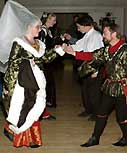
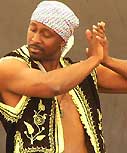
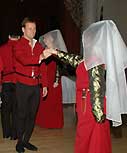
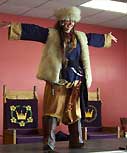

|





